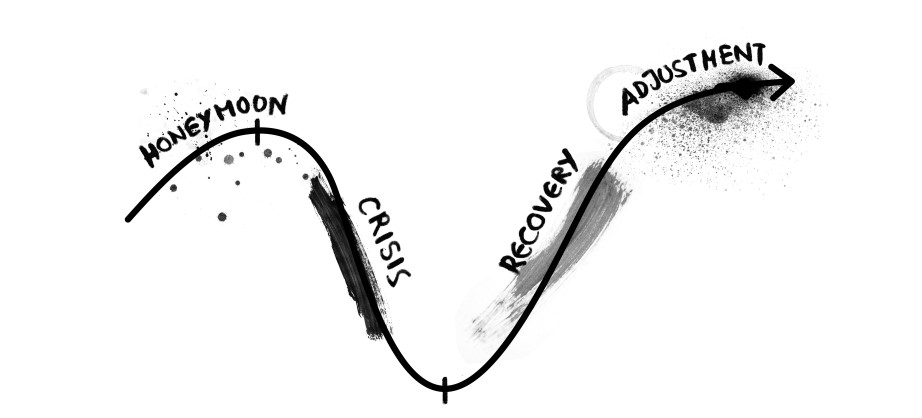Emotional Dynamics Backstage
more than just a working relationship
Working as a team in the entertainment industry can be emotionally challenging. The ups and downs of productions range from hating each other to being one close “family” (and anything in between). Moods can even flip upside down within a few days. This tendency applies especially to team members in international or touring productions, where colleagues also share accommodation. Cruise ship productions are an extreme example of how private and professional lives overlap during a performance contract.
the “U-curve”
Initially presented by Norwegian professor Sverre Lysgaard, The U-curve is a theory that describes social and emotional shifts one experiences when transferring into a new environment – typically referring to the adaption of expats to a new culture. It sets apart four stages:
The emerging dynamics are often unpredictable. However, I’d like to share with you one model that was reoccurring in most of my contracts over the past few years. Whether it be a one-day corporate event, a long-term theatre contract, or a couple of weeks on the road, all assignments showed outlines of a similar trend. As mentioned in my book, I present to you: “The U-curve of stage productions”:
- Honeymoon (first excitement, everything feels great!)
- Crisis (realizing significant differences, culture shock)
- Recovery (personal adaptation, finding new ways for dealing with the situation)
- Adjustment (combining two worlds, making the most of both cultures)
Depending on the social gap, the given duration of the whole process may take up to 48 months.

The melting pot of the performing arts
If we take this model into the performing arts, we quickly realize that joining a new team also means bringing many different cultures into one closed-off setting. Multiple nationalities, as well as various expert backgrounds, come together for an intense working relationship. An emotional contribution is not only common, but often asked for. Therefore, bringing these multiple viewpoints together demands a complex cultural adaption as described in Lysgaards U-curve:
Getting through the emotional dynamics
Starting a new contract, we often feel great excitement. We are looking forward to a new creative project, inspiring people, and new challenges to develop from. However, in many cases, we quickly realize that not all team members are as lovely as they seemed in the beginning. Long rehearsals and time pressure can separate the team and forms individual – often opposing – groups. Only when we enter phase #3, we learn to deal with our differences and focus on getting on well for the remaining time. In the end, it is often hard to leave.
These dynamics happened in almost every contract I did over the past few years, yet to a different degree. Some projects are like an emotional rollercoaster, whereas others have little ups and downs. In some cases, the changes happen abruptly; in others, they morph over several weeks. However, reflecting on the different phases of a team’s cultural adaption helped me to stay positive and focused throughout any turbulence.
If you want to read more about cultural dynamics in stage productions, please check out chapter 3 of my book “Collaborating Backstage”. You will find more exciting theories as well as practical techniques for turning a melting pot into an enjoyable and productive environment.
I am also happy to hear your thoughts about this topic. Contact me anytime to start the exchange!
Stay positive and focused!




